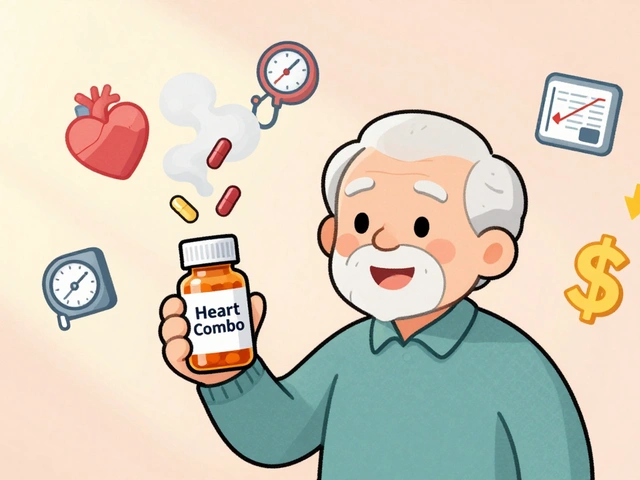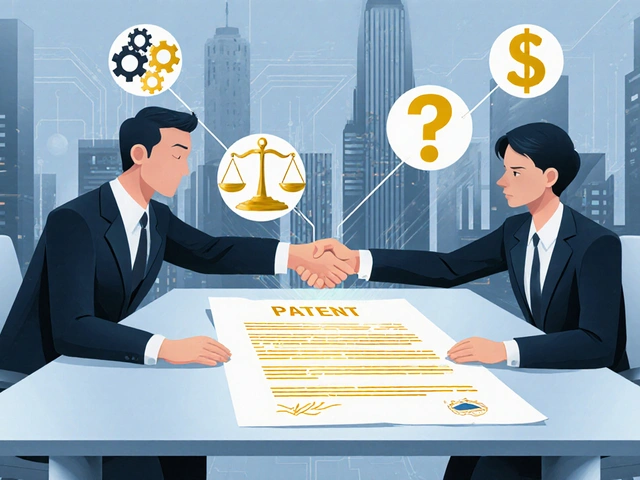Entocort doesn’t show up in TV commercials with cheesy smiles and backyard barbecues, but it’s saving plenty of good days for people fighting Crohn’s disease. Ever wondered how some folks with gut issues end up managing life, work, and family like it’s no big deal? A lot of them have Entocort in their corner. This tiny capsule can make a huge difference for digestion, comfort, and even mental well-being. But there’s a lot to know before you swallow that first pill or count your prescription refills at the pharmacy.
How Entocort Works Inside the Body
Budesonide, the main ingredient in Entocort, is a corticosteroid. If you’re picturing something like prednisone, you’re not far off—but Entocort acts more locally, hanging out mostly in the gut. It’s engineered to work in the last part of your small intestine and the first part of your large intestine. That’s the prime real estate where Crohn’s tends to wreak havoc. Here’s the twist: budesonide goes through what scientists call "high first-pass metabolism." In plain English, most of it gets cleared by the liver on its way through the body, so less ends up drifting around in your blood. This makes side effects usually less intense than with old-school steroids.
If you imagine a firefighter showing up at the scene, Entocort is like the specialist with a local fire extinguisher, not a giant water hose flooding the whole neighborhood. By targeting just the areas that need calming, it can knock back inflammation while letting the rest of your system keep doing its thing. And most people start noticing a difference—think less cramping, reduced diarrhea, and fewer late-night bathroom marathons—within the first couple of weeks.
But what about the science? Clinical trials have shown that Entocort can induce remission in Crohn’s disease, especially for mild or moderate flare-ups. In fact, a 2023 review in “Gastroenterology” noted, "Budesonide remains a valuable induction therapy for ileocecal Crohn’s disease due to its safety profile, especially when long-term systemic steroid exposure is a concern.”
Who Needs Entocort? The Target Crowd
If your doctor handed you an Entocort prescription, there’s a good chance your Crohn’s disease likes to act up in the lower small intestine or the nearby colon. That’s where the delayed-release capsule opens up and gets to work. Doctors rarely use it for ulcerative colitis or Crohn’s disease in other parts of the digestive tract because, quite frankly, the medicine just wouldn’t reach.
Most guidelines recommend Entocort for people with mild to moderate Crohn’s, especially at the start of a flare or when you’re trying to get symptoms back under control. It’s not a “forever” medication. Guidelines from the American Gastroenterological Association say that people should use it to get things calm, but then switch to a different long-term maintenance plan to avoid the risks steroids can pose with long use.
There are some folks who should steer clear: children under 8 (unless the doctor is super experienced), anyone with a known allergy to budesonide or its filler compounds, and people with severe liver disease, because the liver does all the hard work of clearing Entocort from your system. Pregnant women and those breastfeeding need to talk it over thoroughly with their GI specialist and OB-GYN, as there isn’t tons of ironclad data about its risks in pregnancy, though it’s sometimes still used when needed.
Insurance coverage can be tricky, too. Some plans ask you to try cheaper, generic steroids before approving Entocort, even though its safety record is better. If you hit a snag, reach out to your GI nurse or look into patient assistance programs—Entocort is on a bunch of big pharmacy savings lists as of 2025.

What to Expect: Benefits and Side Effects
The best news? Entocort usually works fast. Folks often report diarrhea easing up, appetite arriving just in time for lunch, and even clearer thinking once the gut is less inflamed. If you know the misery of urgent bathroom trips, stopping that hamster wheel alone can feel life-changing. It doesn’t cure Crohn’s, but it can help you reclaim a normal routine, hit the gym, and focus at work without living in fear of your symptoms.
No medication is risk-free, though. Even though budesonide has less whole-body impact than classic steroids, you can still get side effects. The usual suspects include headache, nausea, acne, bloating, and sometimes insomnia—so don’t take it right before bed unless you want to count ceiling tiles all night. Longer use might bring moon face, easy bruising, or more frequent infections, just like with other steroids, but usually it's less pronounced and less common.
Watch out for symptoms like severe mood swings, blurry vision, or swollen ankles—if you get them, call your doctor right away. Budesonide can mess with your body’s natural steroid production over time, so don’t ever stop it suddenly without a tapering plan from your specialist. People with diabetes or glaucoma need to be extra careful because even a "gut-specific" steroid can make those harder to control.
And listen up for this tip: store your capsules at room temperature, out of reach of humidity, kids, dogs, and anyone thinking they’re just vitamins. Missing doses here and there won’t undo everything, but for best results, pop them at the same time every morning with a glass of water before food.
Every month it feels like there’s something new in the world of Crohn’s treatment. But Entocort remains a solid option for local inflammation control, and the lower risk of big-time steroid fallout keeps it in steady prescription use worldwide.
Lifestyle Tweaks for Living Better on Entocort
Pills alone won’t do all the heavy lifting. Crohn’s, like any autoimmune disease, loves to throw curveballs. Lifestyle adjustments are game changers for staying steady on Entocort and feeling your best. Hello, hydration! Steroids can mess with water and salt in your body, so keep that reusable water bottle within arm’s reach. Eating smaller, more frequent meals puts less stress on your gut when it’s recovering. Experiment with low-residue foods—think bananas, rice, eggs, and tender chicken—when flares are raging. Once things settle, work in more veggies and whole grains, but don’t rush.
Stress isn’t just a buzzword; it really can trigger symptoms for lots of Crohn’s patients. Mindfulness apps, simple breathing exercises, or informal yoga (even the kind you do in your pajamas on a living room mat) can really help. Don’t forget sleep—steroids can make it tough to wind down, so put away blue-light screens at least half an hour before bed and create a wind-down routine, even if it’s just brushing your teeth and reading a chapter of something not too intense.
Be smart with over-the-counter medicines. Some painkillers (like ibuprofen) can make Crohn’s worse or clash with Entocort, so always check with your gastro team before you try anything new, even herbal stuff. And keep up with your bloodwork and check-ins. Your GI doctor may want to see how your liver is handling the med, how your cortisol levels look, or if you need bone health checks after long-term steroid use.
But don’t forget about simple joys. Little boosts like sun on your skin, gentle walks, or hanging out with friends (even if it’s just a movie night) keep life sweet during hard times. Plenty of Crohn’s champs keep diaries or symptom trackers—old-school notebook or phone app—because spotting patterns makes it easier to adjust habits or call for help sooner.

Real Experiences: What Patients and Doctors Say
This isn’t just a bunch of pharmacy talk. People who’ve actually lived with Crohn’s and tried Entocort have stories worth hearing. Here’s what Mark, a 34-year-old teacher from Denver, shared in a patient forum last month: “I was skeptical at first, but within a week, my gut settled down. It’s not a magic bullet, but I got my mornings back. Biggest surprise? Almost no bloating—I could finally wear jeans again!” Recurring theme? Appreciation for how quietly Entocort does its thing, though a lot of folks remind each other not to skimp on vitamins or calcium, especially if they’ve been on steroids before.
Doctors have their take, too. Gastroenterologist Dr. Julia Lowenstein, quoted this spring in the "Digestive Health Today" medical update, put it this way:
“Entocort allows us to provide targeted therapy with a much lower overall risk of steroid-related side effects. For patients with mild to moderate Crohn’s affecting the ileum or right colon, it is still a first-line option in 2025.”
Some patients notice a "bounce" when tapering off—minor symptoms might flare back up, so it pays to follow your doc’s plan closely instead of just winging it. Keep them in the loop about any allergies, new meds, or supplements you start, since mixing stuff (even “natural” products) can complicate things.
One last tip: set a reminder to reorder your prescription before you run out. Pharmacy delays can crop up, especially for less common meds. And talk to your doctor if the price tag gives you sticker shock—sometimes a mail-order option or switching to a different insurance tier can help.
Crohn’s disease doesn’t have to call all the shots. Meds like Entocort give you room to fight back and keep moving through your plans, hobbies, and weekend brunches. Even if it’s not forever, the relief can mean everything during the chapters when symptoms try to take over.






Alexander Levin
31 July, 2025 . 09:49 AM
lol why is this even a thing? 🤡 I bet Big Pharma paid the docs to push this. Next they'll say aspirin causes cancer.
Sue Barnes
31 July, 2025 . 18:12 PM
I've seen too many people on this stuff for months and then crash harder than a drunk driver. It's not a solution, it's a bandaid with side effects you don't notice until your bones start crumbling. Don't get comfortable.
Barbara McClelland
31 July, 2025 . 20:12 PM
Hey, I totally get where Sue's coming from, but I've been on Entocort for 8 months now and honestly? It gave me my life back. I went from barely leaving the house to hiking with my niece last weekend. It's not perfect, but it's been a game-changer. 💪 Don't let fear stop you from trying if your doc says it's right for you.
Ady Young
1 August, 2025 . 04:10 AM
I think the key is understanding it's not a cure, it's a tool. I was on prednisone before and it wrecked me. Entocort? Barely noticed the side effects. Still take calcium, still avoid ibuprofen, still track my food - but now I can eat pizza without panic. 🍕
Sean Slevin
1 August, 2025 . 23:08 PM
I mean... if you think about it, the body's immune system is like a paranoid security guard who thinks every sandwich is a threat... and Entocort is like the manager whispering, "Hey, chill out, it's just a burrito." But... what if the manager gets tired? And the guard snaps back? And then... what if the guard starts hallucinating? And then... the guard starts... uhh... I need a nap.
Chris Taylor
2 August, 2025 . 15:44 PM
I was scared to start this too. My gut felt like a war zone. After two weeks on it? I cried in the grocery store because I could pick out my own food without panic. It’s not magic. But it’s quiet, and that’s enough.
Melissa Michaels
4 August, 2025 . 04:29 AM
It is important to note that while budesonide has a favorable safety profile compared to systemic corticosteroids long term use still necessitates monitoring of adrenal function and bone density particularly in patients with pre existing metabolic conditions
Travis Freeman
5 August, 2025 . 21:39 PM
I'm from Nigeria and we don't have Entocort here, but my cousin in Chicago sent me this article. I just want to say - you folks are lucky. We fight with whatever's available. But your honesty about side effects? That's gold. Keep sharing. 🙏
Nathan Brown
6 August, 2025 . 04:08 AM
I think the real question isn't whether Entocort works... it's whether we're okay with treating symptoms while ignoring root causes. Why does the immune system turn on the gut in the first place? Diet? Toxins? Trauma? We treat the fire... but never ask why the house caught on fire. Still... I'm grateful for the relief. Just wish we had more answers.
Matthew Stanford
7 August, 2025 . 06:50 AM
If you're on this, don't skip your calcium. And if you're tapering? Do it slow. I tried to quit cold turkey after 6 months. Ended up in the ER with a flare so bad I couldn't sit. Your doc knows more than Reddit. Trust them. And yes, you can still have tacos. Just not on a Friday night. 😅